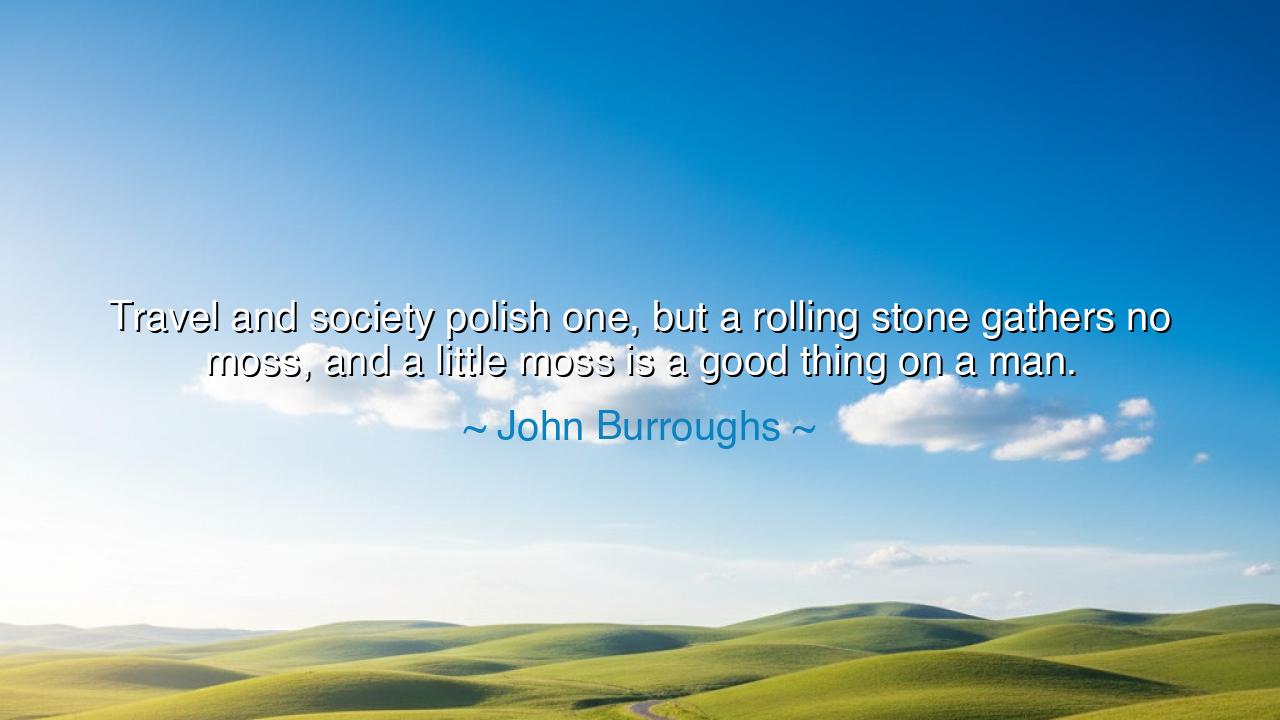
Travel and society polish one, but a rolling stone gathers no
Travel and society polish one, but a rolling stone gathers no moss, and a little moss is a good thing on a man.






"Travel and society polish one, but a rolling stone gathers no moss, and a little moss is a good thing on a man." These words from John Burroughs carry with them the weight of wisdom passed down through the ages. Travel and society, two forces that shape the soul and refine the character, have the power to polish us, to broaden our minds, and to expose us to the richness of the world. They can teach us, enrich us, and mold us into beings of greater depth and understanding. Yet, Burroughs reminds us that too much movement, too much change, too much constant pursuit of new horizons, can leave a person rootless, unable to anchor themselves in the values and relationships that give life its meaning.
The ancient philosophers, particularly the Greeks, understood well the balance between movement and stability. Heraclitus, with his famous doctrine that "everything flows," spoke of the eternal flux of the world, the constant change that defines existence. He believed that movement was the essence of life, and that it was through change that we gained wisdom. But even Heraclitus, in his understanding of the world, acknowledged the importance of balance—that a life of pure chaos, of constant striving without foundation, would lead to a soul in turmoil. The moss that Burroughs speaks of is the grounding element, the stability that allows the human spirit to grow, to root itself in something enduring.
In Rome, a society known for its conquest and expansion, the most respected individuals were not those who had wandered aimlessly through life, but those who had built a legacy. The Romans honored the farmer, the builder, the statesman—those who stayed grounded, who understood that strength came not just from ambition and movement, but from the ability to remain rooted, to nurture and cultivate what they had. The famous Roman proverb, “A rolling stone gathers no moss,” speaks of the value of staying committed, of cultivating patience and perseverance. Without this stability, no lasting success could be achieved. The moss, in this sense, is not a hindrance but a symbol of growth, of the good things that settle when one takes time to root themselves in their purpose.
The story of Alexander the Great serves as a powerful example of the dual nature of this wisdom. Alexander was one of the greatest travelers in history, conquering vast swathes of the known world in a series of relentless campaigns. But in his quest for glory, Alexander often found himself unable to settle or find true peace. His life was one of constant motion, and while he created an empire, he never found the stability that could allow him to nurture the lasting relationships or legacy that a grounded life can bring. By contrast, the philosopher Socrates, whose life was centered on deep thought, conversation, and reflection in one city—Athens—left behind a wisdom that would continue to influence generations long after his death. Socrates did not conquer lands, but his moss of ideas, his roots in philosophy, still flourish in the minds of people today.
Burroughs' insight teaches us that while travel and society can offer the polish of experiences, and while movement can bring great knowledge, there is a danger in wandering too far, in never settling into the things that matter most: our values, our relationships, and our purpose. A life lived too lightly, without a sense of rootedness, is a life that may gain experience, but lacks the depth and sustainability that come from cultivating a sense of belonging. In this sense, the moss that gathers on a stone—though slow, though patient—is what gives the stone weight, meaning, and purpose.
In our own lives, let us balance the energy of movement with the wisdom of stillness. Travel to expand your horizons, to learn, to grow, but do not forget to anchor yourself in the values that give your life meaning. Do not rush through life like a rolling stone, constantly in motion but without the roots to nourish the deeper parts of your soul. Allow a little moss to grow on your stone. Let it gather, for it is in this moss—this stability—that we find the true richness of life. As we move through the world, let us pause, let us reflect, and let us remember that it is not the speed of our journeys, but the depth of our roots that will determine the legacy we leave behind.
Thus, as Burroughs suggests, let us strive to live a life of balance: one that values growth through movement, but also one that cherishes the roots we plant in our families, our communities, and our inner selves. Polish your soul through the world’s adventures, but remember that a little moss—the stability of commitment, of nurturing, and of grounding—is what ultimately makes a person truly strong.






AAdministratorAdministrator
Welcome, honored guests. Please leave a comment, we will respond soon